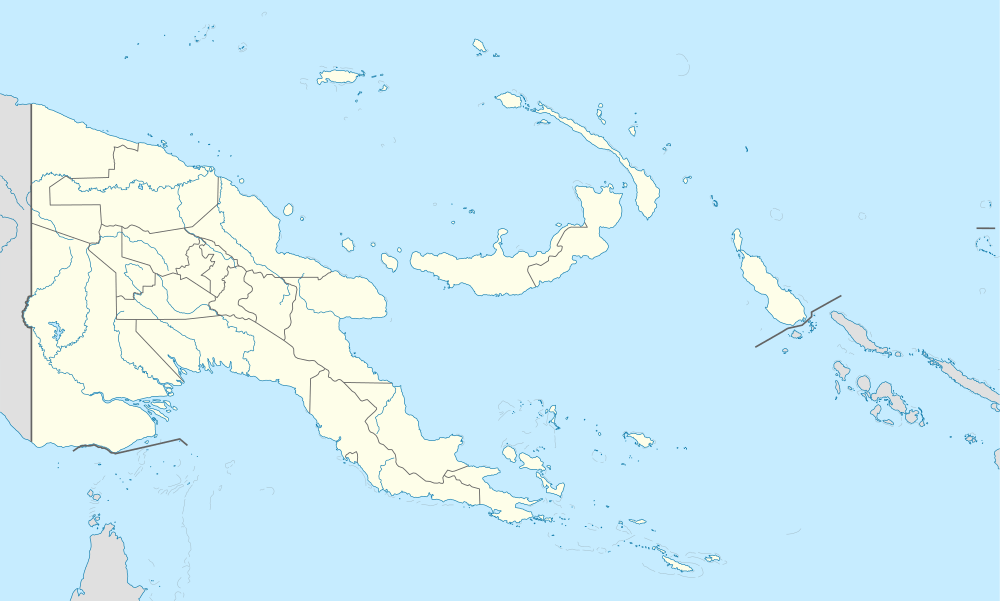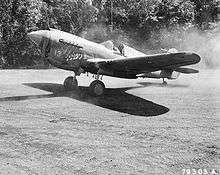Girua Airport
Girua Airport (IATA: PNP, ICAO: AYGR) is an airport serving Popondetta, a city in the Oro (or Northern) province in Papua New Guinea.
Girua Airport (Dobodura No. 7 Airfield) | |||||||||||
|---|---|---|---|---|---|---|---|---|---|---|---|
| Summary | |||||||||||
| Airport type | Public | ||||||||||
| Operator | Government | ||||||||||
| Serves | Popondetta, Papua New Guinea | ||||||||||
| Elevation AMSL | 311 ft / 95 m | ||||||||||
| Coordinates | 08°48′16″S 148°18′32″E | ||||||||||
| Map | |||||||||||
 AYGR Location of Girua Airport | |||||||||||
| Runways | |||||||||||
| |||||||||||

History
Girua Airport is located near Dobodura, to the north-east of the Embi Lakes, north-east of Inonda. To the south is Mt. Lamington, a volcano that dominates the skyline. The airport was built during World War II as part of the Dobodura Airfield Complex during late 1942 and early 1943. During the war, the airfield had several names, including No. 7, West 7, or Horanda No. 7 Airstrip or West 7. It was also known as Kenney Strip, in honor of Fifth Air Force Commander General George Kenney.
The main Dobodura complex had eleven airstrips, most interconnected for taxiing purposes. At the height of the Battle of Buna-Gona supplies began landing at the airfields including artillery spotting planes, a 105mm and five Bren Gun Carriers used to assault Cape Endaiadere,
After the battle, Dobodura was developed into a major airbase, with storage and repair facilities, and interconnecting taxiways to adjacent airfields. Today, Girua is the only airfield still in use, the others being abandoned after the war. [3][4]
Major USAAF units assigned
- 3d Bombardment Group (May 20, 1943 – February 3, 1944)
- 22d Bombardment Group (October 9, 1943 – January 13, 1944)
- 43d Bombardment Group (December 10, 1943 – March 4, 1944)
- 90th Bombardment Group (December 1943 – February 23, 1944)
- 345th Bombardment Group (January 18 – February 16, 1944)
- 417th Bombardment Group (February 7 – April 8, 1944), (Headquarters)
- 49th Fighter Group (March – November 20, 1943)
- 58th Fighter Group (December 28, 1943 – April 3, 1944)
- 475th Fighter Group (August 14, 1943 – March 24, 1944) (Headquarters)
- 432d Fighter Squadron, P-38 Lightning, (May 15 – July 12, 1944), (North Borio Airfield, Dobodura No. 15)
- 433rd Fighter Squadron, P-38 Lightning, (August 14 – October 3, 1943), (Borio Airfield, Dobodura No. 11)
- 418th Night Fighter Squadron (V Fighter Command) (November 22, 1943 – March 28, 1944), P-61 Black Widow
- 80th Fighter Squadron, (8th Fighter Group), (December 11, 1943 – February 28, 1944), P-38 Lightning
- 375th Troop Carrier Group, (August 19 – December 19, 1943) (HQ Echelon)
Airlines and destinations
| Airlines | Destinations |
|---|---|
| Air Niugini | Port Moresby |
| PNG Air[5] | Port Moresby, Tufi |
See also
References
![]()
- Airport information for AYGR from DAFIF (effective October 2006)
- Airport information for PNP at Great Circle Mapper. Source: DAFIF (effective October 2006).
-

- Maurer, Maurer (1983). Air Force Combat Units Of World War II. Maxwell AFB, Alabama: Office of Air Force History. ISBN 0-89201-092-4.
- Airlines PNG flight schedule
.svg.png)